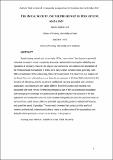Files in this item
The Royal Society and the prehistory of peer review, 1665-1965
Item metadata
| dc.contributor.author | Moxham, Noah | |
| dc.contributor.author | Fyfe, Aileen | |
| dc.date.accessioned | 2017-07-10T17:30:12Z | |
| dc.date.available | 2017-07-10T17:30:12Z | |
| dc.date.issued | 2018-12 | |
| dc.identifier | 245601993 | |
| dc.identifier | aa7a7ca7-a40c-496c-bd10-34a8a731e3af | |
| dc.identifier | 85034606892 | |
| dc.identifier | 000447882600001 | |
| dc.identifier.citation | Moxham , N & Fyfe , A 2018 , ' The Royal Society and the prehistory of peer review, 1665-1965 ' , The Historical Journal , vol. 61 , no. 4 , 863 , pp. 863-889 . https://doi.org/10.1017/S0018246X17000334 | en |
| dc.identifier.issn | 0018-246X | |
| dc.identifier.other | ORCID: /0000-0002-6794-4140/work/55643911 | |
| dc.identifier.uri | https://hdl.handle.net/10023/11178 | |
| dc.description | The research for this paper was funded by the Arts & Humanities Research Council, grant AH/K001841/1 | en |
| dc.description.abstract | Despite being coined only in the early 1970s, ‘peer review’ has become a powerful rhetorical concept in modern academic discourse, tasked with ensuring the reliability and reputation of scholarly research. Its origins have commonly been dated to the foundation of the Philosophical Transactions in 1665, or to early learned societies more generally, with little consideration of the intervening historical development. It is clear from our analysis of the Royal Society's editorial practices from the seventeenth to the twentieth centuries that the function of refereeing, and the social and intellectual meaning associated with scholarly publication, has historically been quite different from the function and meaning now associated with peer review. Refereeing emerged as part of the social practices associated with arranging the meetings and publications of gentlemanly learned societies in the late eighteenth and nineteenth centuries. Such societies had particular needs for processes that, at various times, could create collective editorial responsibility, protect institutional finances, and guard the award of prestige. The mismatch between that context and the world of modern, professional, international science, helps to explain some of the accusations now being levelled against peer review as not being ‘fit for purpose’. | |
| dc.format.extent | 357460 | |
| dc.language.iso | eng | |
| dc.relation.ispartof | The Historical Journal | en |
| dc.subject | Peer Review | en |
| dc.subject | Scientific journals | en |
| dc.subject | Scientific publishing | en |
| dc.subject | Royal Society | en |
| dc.subject | Research evaluation | en |
| dc.subject | D History General and Old World | en |
| dc.subject | Q Science | en |
| dc.subject | T-NDAS | en |
| dc.subject | BDC | en |
| dc.subject | R2C | en |
| dc.subject.lcc | D | en |
| dc.subject.lcc | Q | en |
| dc.title | The Royal Society and the prehistory of peer review, 1665-1965 | en |
| dc.type | Journal article | en |
| dc.contributor.sponsor | Arts and Humanities Research Council | en |
| dc.contributor.institution | University of St Andrews. School of History | en |
| dc.identifier.doi | https://doi.org/10.1017/S0018246X17000334 | |
| dc.description.status | Peer reviewed | en |
| dc.identifier.url | https://www.cambridge.org/core/journals/historical-journal | en |
| dc.identifier.grantnumber | AH/K001841/1 | en |
This item appears in the following Collection(s)
Items in the St Andrews Research Repository are protected by copyright, with all rights reserved, unless otherwise indicated.

